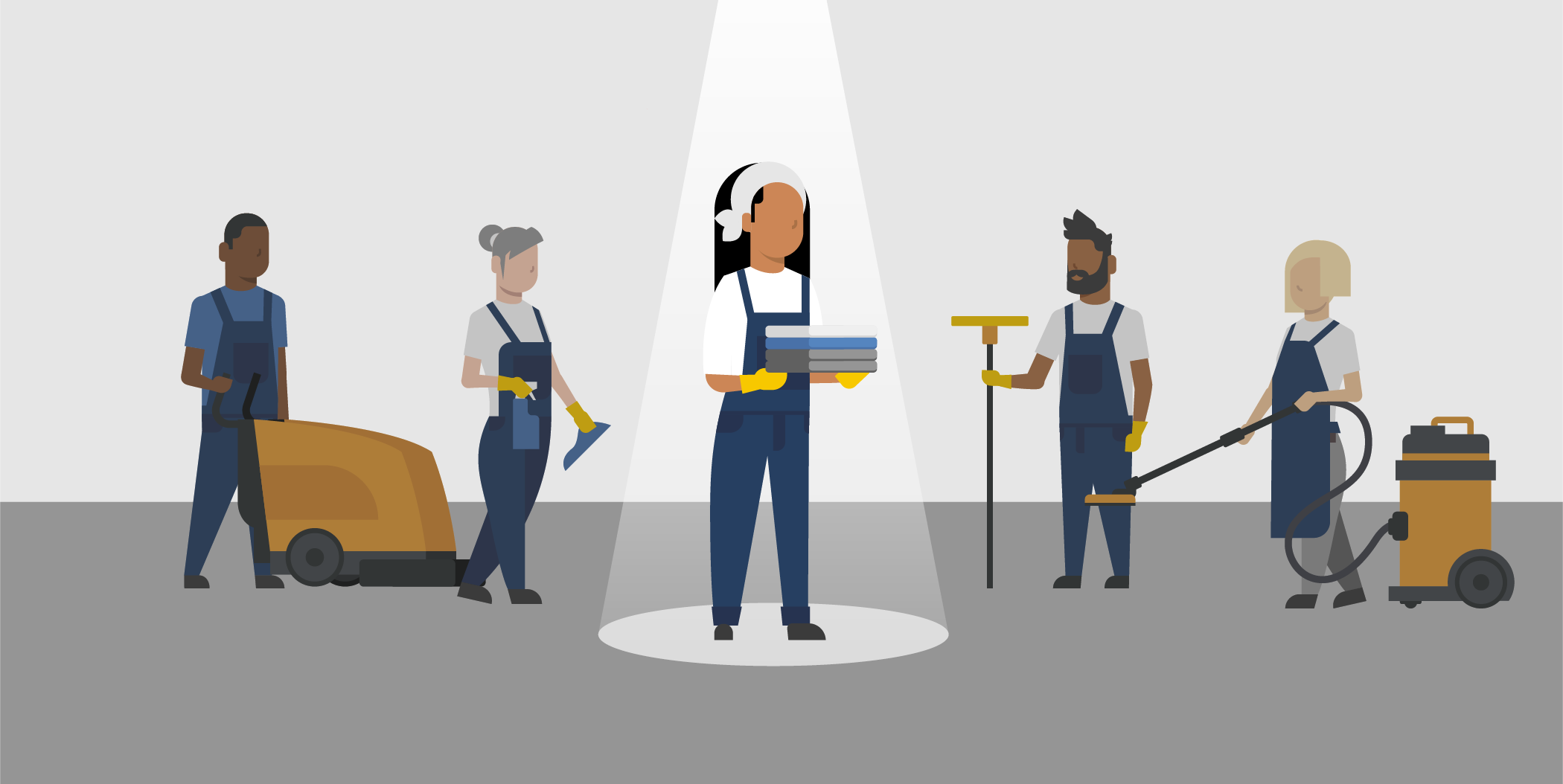Many cleaning businesses start small — with just a bucket and sponge, ready to get to work. While there’s nothing wrong with this, if you at some point wonder why some clients choose you and others don’t, it may be time to consider a marketing strategy. Don’t worry; developing an effective marketing strategy doesn’t have to be complex or time-consuming. Understand Your Target Audience: Who are Your Clients? Your business’s survival depends on your clients, so it’s crucial to understand your target audience when creating a marketing strategy. Are your clients private individuals or businesses? If both, you’ll need to adjust your approach for each audience. Factors like demographics, age, and location can also influence the tone of voice you should use in your marketing materials. Example Margaret runs a cleaning business in London with a strong focus on environmental sustainability. Her team of ten employees travels to cleaning jobs by bike or electric car, servicing homes and flats within a 10-mile radius of central London. Most of her clients are wealthy families who view professional cleaning as a luxury, allowing them more time to enjoy life without the hassle of household chores such as vacuuming and sweeping floors. These […]
How to Advertise Your Cleaning Business Effectively
The competitive cleaning industry requires clear, targeted advertising to ensure that clients choose your service over hundreds of others. But where should you advertise, and what will resonate most with potential clients? While traditional methods like newspaper ads once sufficed, today the digital market offers endless opportunities. Keep reading to explore the best online and offline advertising methods for your cleaning business. 6 Digital Ways to Effectively Advertise Your Cleaning Service 1. Create a Website The first and most essential step to advertise your cleaning business is creating a website. This allows potential clients to find your company online. Your website serves as your platform to showcase everything from prices and contact information to your business story. Ensure your website text includes keywords that people are likely to use when searching for cleaning services in your area. This practice, known as SEO (Search Engine Optimisation), involves using relevant keywords and producing quality content to make your website easier to find. Another tip is to include videos on your site, as Google’s algorithm favours video content, and clients often find it more engaging. Videos can convey more than text alone, so get creative and highlight the qualities of your cleaning service […]
How to Make Your Cleaning Business Stand Out from the Competition
The cleaning industry is a significant and growing sector in the UK, fuelled by increased health awareness following Covid-19. It’s also highly competitive, with frequent price bidding. While clients often look for good prices, they also appreciate great service and shared values. Anyone can offer low prices, but true growth and competitiveness lie in identifying and effectively communicating your cleaning business’s unique strengths to clients. Factors and Trends that Make Your Cleaning Business Stand Out Documentation and Credibility Documenting your cleaning service as a safety net for both you and your staff, providing evidence in case of issues or disputes. It also offers added value to clients, allowing you to show progress and results. This goes hand in hand with quality control, where you ensure that your business consistently meets the standards agreed upon with the client. Consistent documentation and quality control enhance your professionalism and demonstrate your commitment to responsible practices — key factors that make you stand out from the competition. ESG and Sustainability ESG stands for Environmental, Social and Governance. It’s a standard measure of a company’s impact on the environment, society, and its credibility. By prioritising these initiatives, your cleaning business can gain a competitive edge […]
Scheduling Software for Cleaning Services – Revolutionise Your Workflow with CleanManager
Managing your cleaning jobs and employees more efficiently has never been easier. With CleanManager’s robust scheduling software, you gain a clear overview of all your clients, employees, and cleaning tasks, while automating time-consuming administrative routines. Say goodbye to manual scheduling headaches and hello to streamlined operations. “CleanManager allows us as a senior team to keep an eye on every function from staffing, attendance, inventory to even all resources for every site, all in one place.” Barry Fisher, Managing Director of Titan Cleaning and Facilities Management Ltd The CleanManager Employee Scheduling App Our employee scheduling app further enhances your ability to manage your cleaning business. Employees can access their schedules, clock in and out of tasks, and even attach photos as proof of completed work. This app ensures you have a total overview of time usage, helping you bill and pay for the correct number of hours. Easily Locate Available Staff for New Cleaning Jobs With powerful scheduling software like CleanManager, managing your cleaning jobs is a breeze. Our organised calendar provides a comprehensive overview of your team, allowing you to easily see who’s available and who’s busy. This staff scheduling software ensures you can allocate resources efficiently and avoid any […]
Get the newest posts directly in your inbox completely free
All-in-One Cleaning App for UK Cleaning Businesses
In the busy world of cleaning services, efficiency and organisation are key to maintaining a successful operation. That’s where CleanManager comes in. As an all-in-one cleaning services software, CleanManager is designed to automate your workflow and help you make the most of your time, allowing you to focus on what truly matters—growing your business and keeping your clients satisfied. Streamline Your Operations with CleanManager App for Cleaners CleanManager is more than just software; it’s a comprehensive solution tailored to meet the unique needs of cleaning businesses. From intelligent scheduling to quicker invoicing and payroll without errors, CleanManager covers all aspects of your operation. Our app for cleaning services in the UK and beyond ensures that you have a comprehensive overview of all your tasks, making your cleaning business management more efficient and less stressful. Key Services of CleanManager’s Software Intelligent scheduling Efficient scheduling is crucial for any cleaning business. With CleanManager’s intelligent scheduling feature, you can easily manage and adjust schedules to meet clients’ needs. This cleaning company software allows you to allocate resources optimally, ensuring no job is overlooked, and your staff are always where they need to be. Faster invoicing Invoicing can be a time-consuming process, but not […]
From Technology Scepticism to Success with Change Management
An array of new cleaning technologies and digital tools are available and ready to use. These technological advancements can effectively tackle staff shortage and the increased demand for cleaning quality caused by Covid-19. But fully embracing digitalisation and technology can be challenging as they disrupt the working routines. Both you and employees often have concerns about implementation time and job displacement. But behold! There are effective strategies to solve these issues through step-by-steps and change management. Let’s delve into these issues and explore potential solutions. Addressing Employee Concerns and Misconceptions about Technology and Digitalisation The quickest way to failure when implementing new technology is to sideline your employees. If you’re aiming for failure, simply enforce changes without involving those who will be directly affected, and watch the project go down the drain. But you want the opposite, of course, so you should do the opposite. To successfully counter employee concerns regarding technology and digitalisation, the first crucial first steps are fostering understanding and communication. Listening to employee concerns and misconceptions provides an overview for constructive action. You can benefit from listening to your employees in their day-to-day work and discussing potential improvements. This will give employees co-influence. For example, conduct […]
Dusting Off the Cleaning Industry with Technology and Digitalisation
Technological advancement moves swiftly, which offers companies innovative business opportunities. Yet, following this rapid pace and integrating new technology proves challenging. The cleaning industry is no exception. The cleaning landscape has shifted since Covid-19. There is heightened demand for quality and documentation amid the continued staff shortage. Embracing technology, digitalisation, and innovation may be the solution. Let’s explore the definitions of these terms and weigh their pros and cons for your cleaning business. We use technology and digital tools every day in our digital age, including in the cleaning industry. Yet, comprehending every aspect of new technological solutions can be difficult. However, starting with understanding the relevant terms and their functions is a crucial first step. As you continue reading, you’ll find explanations of the three main components: Technology, digitalisation and innovation, along with examples of use in the cleaning industry. Technology and Its Benefits in the Cleaning Industry Technology is the use of scientific knowledge to solve real-life problems. It makes life easier both in professional and domestic settings. Everything that was ever invented by humans is a form of technology. In the cleaning industry, technological advancements have introduced machinery and robots into cleaning. The technology has come a […]
Attracting the Young Generation to the Cleaning Industry
One major challenge facing cleaning companies today is attracting and retaining the young generation. To stay relevant in modern times, the industry should embrace environmental- and social sustainability. They also need to address the less favourable aspects of cleaning jobs, while also promoting the positive impacts cleaning has that people tend to forget. Why the Cleaning Industry has to Change The cleaning industry is in a labour shortage, particularly with younger workers. Data from the British Cleaning Council reveals that the percentage of cleaning staff under 25 is significantly lower than in other sectors across the UK. Additionally, there is a much higher percentage of people over 55 in the cleaning industry. The difference may stem from the negative perception of cleaning work as low-skilled, low paid, with little career opportunity and workplace well-being. To attract younger employees, the industry must shift its narrative. This requires reflection and action. Cleaning companies need to reflect and determine the most important issues and act on it. Otherwise, companies will increase the labour shortage when their employees start to retire and no young workers want to replace them. This requires knowledge of what younger generations seek in a job. They value sustainability, opportunity […]
Social Sustainability and Its Positive Impact on Your Cleaning Business
The cleaning industry has a huge shortage of qualified workers and needs new ways to attract staff. This is one of the reasons why cleaning companies need to consider social sustainability. Both employees and clients are demanding a stronger focus on social responsibility, because the future regards the wellbeing of everyone. But how can your cleaning business implement social sustainability, and what are the benefits? Understanding Social Sustainability: The S in ESG ESG stands for Environmental, Social and Governance. These three parts serve as benchmarks for assessing a company’s environmental impact, social contributions, and governance practices. ESG reports are published annually to report results and to motivate the company to improve the numbers during the next year. It also demonstrates achievement to key stakeholders such as clients, employees, and investors. Now, let’s go back to the topic of social sustainability, which prioritises principles and policies of people. Companies are encouraged to contribute positively and focus on the wellbeing of individuals. Social sustainability covers several areas, including health and safety, diversity, wages, equality, and education. Every company in the world affects society through its approach to diversity and equality in the workforce. Positive impacts are seen when companies e.g. hire minorities […]








